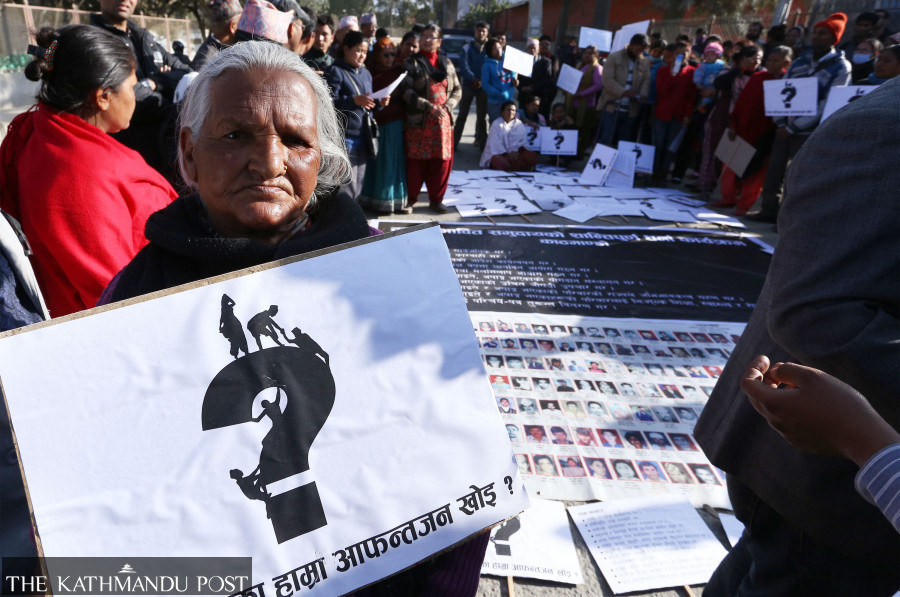National
Families of persons disappeared during insurgency start filing criminal cases with police
Victim families say they have lost faith in the transitional justice commissions.
Binod Ghimire
Frustrated by the delay in transitional justice process, families of some individuals who were disappeared by the Maoist rebels and the state security forces during the decade-long insurgency have started filing criminal cases with the police
Families of around two dozen disappeared victims from eight districts have so far visited their district police offices to file complaints against the alleged abductors. However, not a single complaint has been registered yet, as the police have either sought time to study the complaints or have refused to entertain them saying they do not fall under their jurisdiction.
The Advocacy Forum and International Commission of Jurists have been supporting the families to register the complaints.
“I have filed a complaint with Baglung district police against the abductors of my wife. The police have asked for some time to study the complaint before deciding whether to register it or not,” Khum Lal Sharma of Nisikhola Rural Municipality, Baglung, told the Post. “We are compelled to opt for a regular justice process because we have lost faith in the transitional justice commissions.”
Sharma’s wife Sushila was taken away by the Maoist rebels on December 1, 2005.
Shrama said he had filed a complaint at the Commission of Investigation on Enforced Disappeared Persons with a hope that justice would be delivered. But six years after its formation, Sharma says the commission has done little to investigate the whereabouts of his wife.
“The commission did nothing in the last six years. The Penal Code that came into effect three years back has opened the door for us to file the complaint with the police.”
Section 206 (1) of the Penal Code prohibits enforced disappearance and lists it as a criminal offence for the first time. Anyone convicted of disappearing an individual could face 15 years of jail and Rs 500,000 fine or both.
If the victim of the enforced disappearance is a child or a woman, the sentence could be increased to 17 years.
According to Sharma, the then area in-charge of the CPN (Maoist), chief of village people’s government and its deputy chief had taken his wife for an "inquiry".
That was the last time Sharma saw his wife.
Sharma says there are eyewitnesses who saw the Maoist rebels taking his wife away.
"The police must register the complaint and start investigation. There is abundant evidence to support the complaint," he said.
The Penal Code requires the police to register complaints of enforced disappearances. If they don’t, it can be lodged at the District Government Attorney Office.
“If the district attorney's office also refuses, we will take the case to the High Court and the Supreme Court,” Bikash Basnet, a programme manager at Advocacy Forum, told the Post. “We are supporting the complaint registration at the request of the victims’ families who have lost hopes from the disappearance commission.”
In the last six years the commission has received 3,223 complaints of enforced disappearances perpetrated both by the security forces and the Maoists. After looking into the complaints, the commission has identified 2,494 cases as genuine.
The latest report by the International Committee of the Red Cross, however, says 1,333 people are still missing in connection with the armed conflict.
The victim families whose members have disappeared have each been provided Rs1 million in compensation but not all have received the amount. The report of the disappearance commission shows only 1,227 such families have received the compensation.
“International laws and the different rulings by the Supreme Court say that statute of limitations is not applied in cases of serious human rights violations,” Kashiram Dhungana, a legal advisor with the ICJ Nepal, told the Post. “Enforced disappearance is a continuous crime.”
Even the Supreme Court has mentioned in its ruling on a writ petition filed by advocate Madhav Kumar Basnet that the act of disappearance is a gross human rights violation and the alleged perpetrator(s) needs to be prosecuted under the criminal law.




 16.12°C Kathmandu
16.12°C Kathmandu














